Join us to learn about how to become a Salesforce Developer. In this post, we will talk about what you need to do to become a Salesforce Developer and the reasons to become an SFDC Developer. We will also cover the Salesforce Developer roles and responsibilities with the roadmap for a Developer.
What is a Salesforce Developer?
Salesforce Developer is one of the most demanding skills in Salesforce industries. A developer is a programmer who builds applications for business. Salesforce Developers are ones who used to write the code on the Salesforce platform using Apex, JavaScript, Aura, and Lightning Web Components.
Salesforce Developer Roles and Responsibilities
What does a Salesforce developer do? The Roles and Responsibilities of a Developer are to understand the platform’s out-of-the-box functionality and then customize the application based on client requirements using coding or configurations. These developers use tools such as Apex, Visualforce, Aura, and Lightning Component in order to develop apps.
Roles of a Salesforce Developer Jobs
Here are list of responsibilities for the developer job description.
- Business Requirement: The developer needs to support business requirements with out-of-the-box functionality.
- Solution: Should be able to provide customized solutions using the Salesforce platform.
- Analytical skills: Should handle requirement gatherings and produce functional analysis.
- Communicate: The developer should communicate well with project managers, clients, and architects to ensure efficient participation in the software development life cycle.
- Troubleshoot: You should be able to troubleshoot any bugs in the system.
- Time Management: Able to understand the Salesforce Agile implementation and should follow various timelines and development goals.
Salesforce Developer Responsibilities
Here are some of the responsibilities in a developer job are as follows:
- Development: The Salesforce Developer is responsible for application development and helping the team.
- Team Building: As a Senior developer, they are responsible for giving training to junior developers.
- Maintenance: They are responsible for maintaining the already existing applications and upgrading the application.
Salesforce Developers Salary
How much I can earn as a Salesforce Developer is always a hot question. As per Salesforce Article, the average Salesforce Developer Salary is $108,000 in the USA. Here is the salary for developers in the United States and Canada.
| Location | Junior pay band | Senior pay band | Contract rate (per day/hour) |
| United States($) | 101,750 – 130,250 | 130,250 – 180,000+ | 94-161 (p/h) |
| Canada (C$) | 108,750 – 133,750 | 133,750 – 165,000+ | 70 – 181 |
Learn more about Developer Salary in different countries and how to earn more as a Developer.
Skills Required to Become a Salesforce Developer
To become a developer, you should have programming skills, analytical skills, and excellent problem-solving and communication skills.
How to become a Salesforce developer?
What do I need to be a Salesforce Developer? We are glad that we did one FREE Developer training course in ApexHours. The good news is that we recorded all sessions and posted them on YouTube. After completing this free course, you will master Apex and understand the Trigger, Batch job, SOQL, basics of Aura, and LWC. Let’s start your journey with the world’s No. 1 CRM software!
- Become a Salesforce Admin.
- Learn Coding.
- Learn Software development life cycle.
- Learn Salesforce Consultants Skills.
- Get Certified and clear your PD-1 exam.
- Get hands-on experience.
- Networking.
- Find an Adviser.
- Get ready for the Salesforce Developer Interview.
- Find a Salesforce Developer Job.
#1. Become a Salesforce Admin
If you want to become a Salesforce Developer, then the first step is to become a good Salesforce Admin. You can become a successful developer once you understand the platform very well and complete the business requirements with out-of-the-box features.
Learn Salesforce with Trailhead and if you like videos then check ApexHours FREE Salesforce Training.
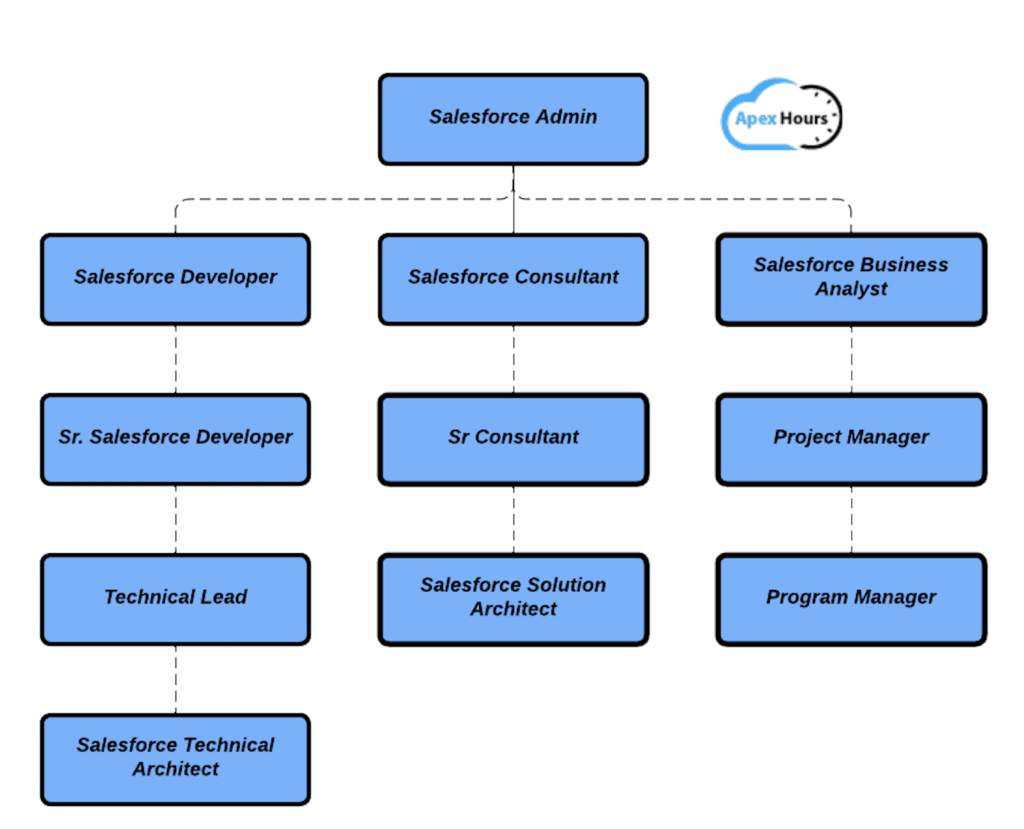
After becoming a good Salesforce Admin, decide the Salesforce career path base on your self-assessment. If you love coding, then move to the developer path you can decide on the Consultant or Business Analyst.
As a Salesforce #AwesomeAdmin you may be a bit hesitant about the coding side of the Platform. Chances are, you already know a ton about writing code and haven’t even realized it! Check this session to learn more about Apex Basics in Admin terms and find out how utilizing functionality such as Objects, Fields, Formulas, Flows, Workflow Rules, and Processes is just a small step away from writing Apex!
#2. Set the Roadmap to Become a Developer
If you want to become a developer, then after learning the Admin, you need to start learning Coding. As a Developer, you need to learn Codings like Apex, JavaScript, Aura, and LWC. Check out Salesforce Developer Training for FREE.

Learn all the below topic to become a good developer:-
- Learn about the OOP concept in programming language
- Learn Apex Fundamental
- Apex Trigger
- Learn Java Script to become a good lightning developer
- Now it is time to learn about Salesforce UI components like Aura and LWC.
2.1 Roadmap to Become Developer
There are lots of things you need to learn to become a Developer. It is better to design your roadmap:-
- Backend Developer: I will highly recommend starting with backend development with Apex. Where you learn the basics of Apex, Triggers, Batch Apex, and Test classes.
- UI Developer: Once you know the basics of Apex, it is time to become a UI Developer. Where you need to learn JavaScipt, Aura, and LWC.
- Get Expert with Tools: Learn about different development tools that can simplify your life and increase your productivity. Learn about GIT and DevOps. Learn about how Salesforce deployment works.
- Sr. Developer: Once you know the basics of Apex and UI development. It is time to learn different Design patterns and frameworks.
- Technical Lead Developer: Make your goal to become a leader in your stream. For that, you need to be a good architect and have an understanding of solutions.
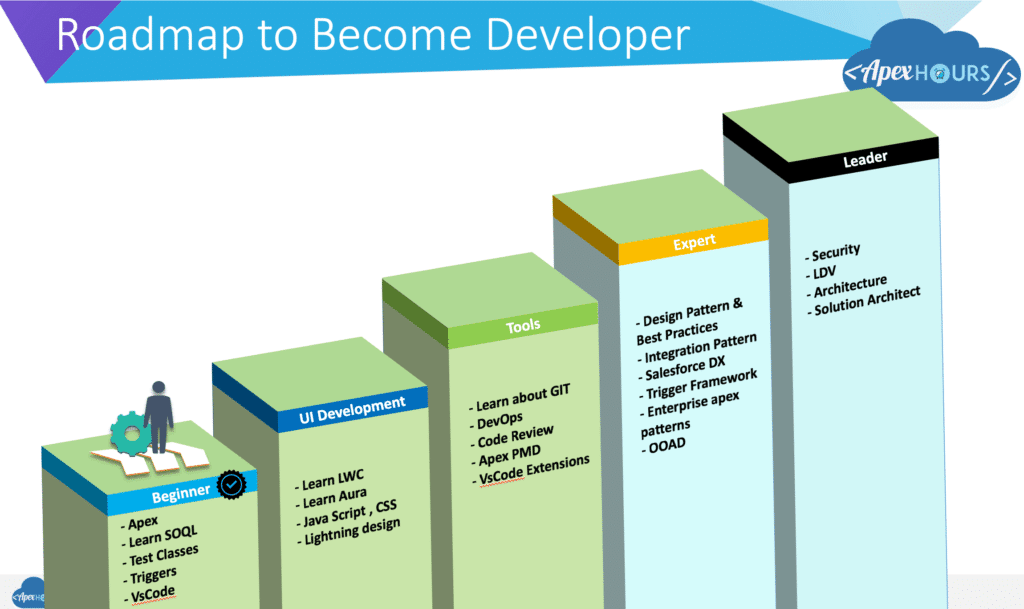
Your roadmap can be different from the above. This is a sample to get started and decide what all topics you need to learn.
2.2 How to get started in Salesforce
- Trailhead: The only thing you need to get started in Salesforce is to register yourself on “Trailhead” and get started for free! Sign up for a new account, and voila! You have a bunch of ways to start exploring any topic/role you want to grow in- just search for what you want.
- Salesforce Community: Also, make sure to associate with your local Salesforce Community group- you can join the group under the “Community” tab on the site. There are multiple events and talks hosted by these communities to get you up to speed on the technical and functional topics, any new trending topics, updates, new releases, platforms, etc.
- Partner Portal: It has partner launch event webinars, detailed additional topics shared exclusively for partners, and so on. Specialized credentials, such as accredited professional certifications, are introduced for partners, too.
- Journey to Salesforce: Journey to Salesforce also known as J2S is officially available in US, Canada and India. The program is designed to prepare students and non-Salesforce professionals for a career as a Salesforce professional in the ecosystem. Join Journey to Salesforce.
- Apex Hours: Apex Hours is a one-stop platform to learn Salesforce skills and technology. It has all the tutorials you need to get started with Salesforce.com and become a master in it.
2.3 Resource to Learn Development
- Apex Specialist Super badges
- Advanced Apex Specialist Super badges
- Apex Hours FREE Salesforce Developer Training.
- Data Integration Specialist Super badges.
- Lightning Web Components Specialist Super badges
- Security Specialist Superbadge Super badges
#3. Learn Software development life cycle
If you want to become a Software developer, then you should learn about how SDLC works and the methodologies behind that term. It would help if you learned about below topics:
- Introduction to SDLC.
- The agile concepts and waterfall (and more..)
- The DevOps.
#4. Learn Salesforce Consultants Skills
Here are 5 basic soft skills any Consultant will need to become great a Developer.
- Adapt Your Communication Style
- Active Listening
- Understanding Business Process
- Industry Knowledge
- Relationship Building

Skills Great Salesforce Consultants Have In Common.
#5. Get Certified and clear your PD-1 exam
Certifications are another important milestone to prove your hands-on expertise. Complete your Salesforce Platform Developer 1 (PD1) certification to get a hold of your Salesforce basics.
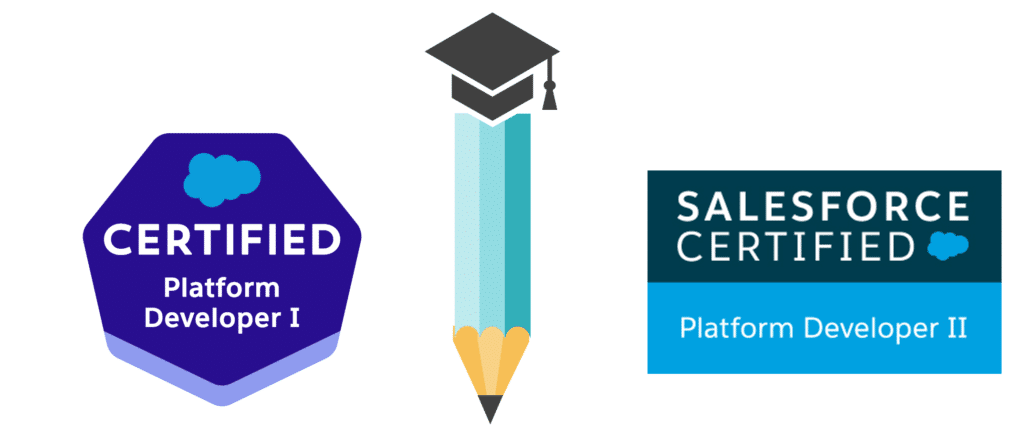
6. Get hands-on experience
Once you know about Salesforce development from Training or Trailhead. The next step is to get some hands-on experience.
6.1 If you are already an Admin
If you are already working a Salesforce admin then start taking small small work from your project to get some hand-on experience.
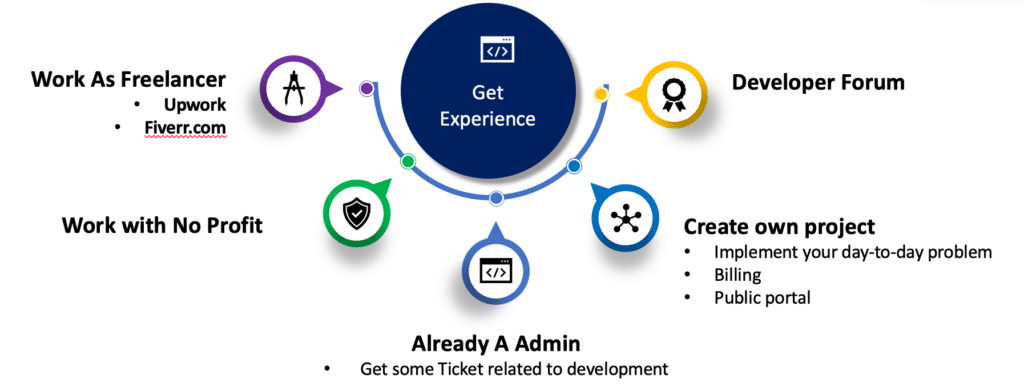
6.2 Volunteering opportunities with Nonprofits
If you are not working and are new to Salesforce. Then, start finding volunteering opportunities with Nonprofits and Education cloud customers- it would help you gain hands-on real-time experience to solve real-world problems and is also considered and counted as work experience by most companies. Learn more Volunteer Your Salesforce Expertise | Salesforce Trailhead.
6.3 Join Salesforce Developer Forum.
The developer forum is another option for learning about Salesforce Developer challenges.
#7. Networking
Networking is the key to everything. Try to find another developer who is also learning Salesforce. You can find them and start a study group.
7.1 Join Salesforce Community
Also, make sure to associate with your local Salesforce Community group- you get the option to join the group under the “Community” tab on the site. There are multiple events and talks hosted by these communities to get you up to speed on the technical and functional topics, any new trending topics, updates, new releases, platforms, etc.
7.2 Find a recruiter
Find a recruiter who can help you to get your first job or let you know the latest trend in the Salesforce Echo System.
#8. Find an Adviser
Find an adviser or mentor for you. If you are already working, then work with your Sr. Developer or try Mentorship program this is one-to-one as well as many programs where a newcomer can directly get a mentor assigned to them who could guide them right from exploring the Salesforce platform to landing a job by helping with cv preparations, mock interviews, support, etc.
#9. Get ready for the Salesforce Developer Interview
Once you have good knowledge of Salesforce and have hands-on experience. It is time to get ready for the Interview. Check our Apex Hours Salesforce Interview Question series.
#10. Find Salesforce Developers Job
Once you are ready with Developer Knowledge. The next step is to find a Developer job.
- Update your LinkedIn Profile: Keep your LinkedIn profile up-to-date.
- Trailhead Hire Me button: As soon as you feel you have good hands-on knowledge of your area of interest, have got yourself certified to prove your experience, and are looking for a job- Trailhead has introduced a “Hire Me” button as well on your Trailhead profile- which lets the employers know you are available for new opportunities and they can directly contact you
- Find a recruiter: Find a good recruiter who can help you promote your profile and update your resume.
- Find consulting Partners: Find Salesforce consulting partners in your country and local state. And apply for jobs from their career page
- Interview: Keep giving the interview and if you are not selected. Keep a note of all feedback and do your best next time.
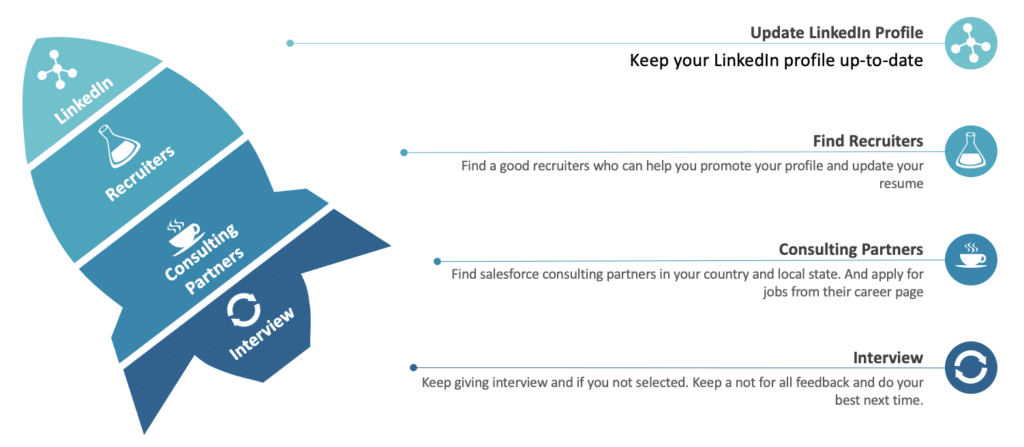
Check out our post on How to get a job in Salesforce as a Fresher.
Resources for Job Seekers
Learn about the resources Trailblazer Connect has available for job seekers. Once you start exploring Trailhead, you will understand how simple it is to really get started on an area of your interest.
Reasons to Become a Salesforce Developer in 2023
Here are some reasons to become a Developer.
- Demand and Opportunity
- World Dominating Technology
- High Earning
- Multiple Routs into the Ecosystem
- Salesforce Community
FAQ’s
It depends on you. If you have previous programming experience then 2-3 month is good time to become a entry level Salesforce Developer. You can become expert in five to six month.
If you have a bachelor’s degree in computer science, that will help you, but a computer background is not needed to become a Developer.
Yes, We see lots of non-IT people become Salesforce developers in the past. Here is one success story “Journey from Non-IT to Salesforce Developer“
To learn Salesforce, first you need to learn Salesforce Admin stuff, which takes almost 1-2 months. Then, based on your past experience and hard work, you can learn coding within 2-3 months.
A Salesforce developer writes code in Apex, VF Pages, Aura Components, Lightning web components, and JavaScript.
Summary
Wish you all the best for your Salesforce Developer Journey. Do certifications, do hands-on work, do super badges, volunteer, and reach out to the Salesforce community with questions/ help needed- you don’t have to look back then!

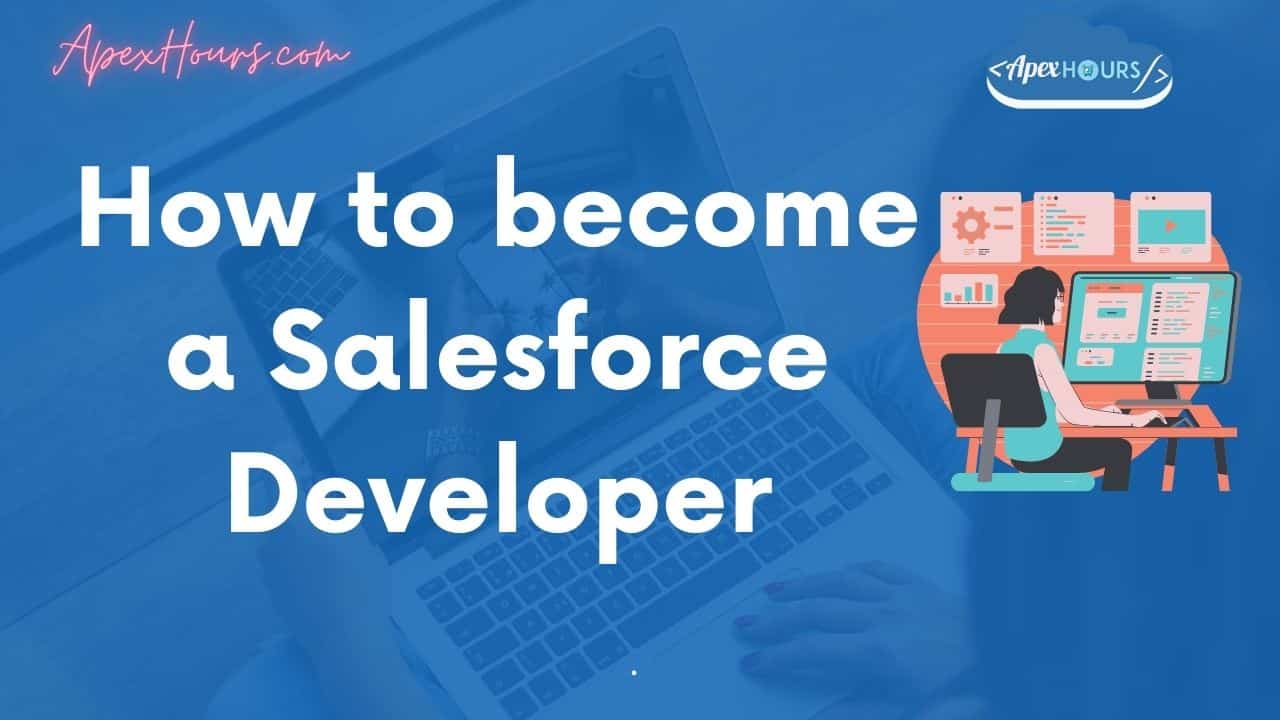




Thanks for the information
Glad you like it
Thanks Amit for sharing such derailed information, appreciate your time.
I hope this will help you to become a Salesforce Developer.
Your suggestion that volunteering for a nonprofit if you don’t have experience is at best exploitive and quite possibly harmful to both the organization and the volunteer. Even the Trailhead module you link to calls this out directly, saying “commit to using your current skills and expertise to help an organization make the most of Salesforce technology. You shouldn’t view a pro bono project as your chance to gain experience.”
Volunteering should be a way you choose to give back to your community with the experience you already have, not a way to pad your resume when you don’t have that experience.
Thank you so much for raising this point. I totally agree with your point. If you don’t have experience does not means you are a bad developer. Everyone has to start from Zero. If you are already working in any company you can start from there.
Working in Nonprofile is the 6.2 option. Before that, we included some points to get certified (Point 5) and do hands-on trailhead projects (2.2) which actually gives you some experience.
We are not asking to learn Development on non-profile org. You can learn on the playground and trailhead. If you are certified means you know how to code. If you Volunteer after that there is no harm in doing that. Also, you will get some tech leads or Architects in a non-profile organization which will help you to improve your skill.
Anyhow in any use case, you need to learn to code and do practices. Before starting a project.
As someone who has done extensive volunteer work in the past I *totally* disagree with this post. Non-Profit and volunteer opportunities have always had a strong, symbiotic, relationship. Volunteer work is an excellent way to learn a skill, build a resume, and give back while doing so. If this were not the case it would be devastating to non-profit organizations. It is not as if the organization is forced to make the hire. Non-profit organizations have long been a great place to experiment with and/or begin a career and one to be proud of.
Quite an informative post Amit. I specifically liked your image on “Roadmap to Become a Developer”. 😊
Thanks @Ashish bhai. Coming from you means alot for us.